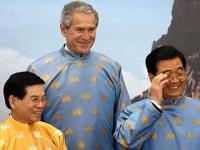As dust settles from the recent UN climate-change conference in Indonesia, some observers are looking to China as the looming pivotal factor in the global-warming struggle.
The world’s most populous nation, now also neck-and-neck with the U.S. as its biggest greenhouse polluter, was the subject of a recent news article under the banner “As China goes, so goes global warming.”
The best the Bali delegates could achieve was two more years of talks on setting emission curbs, but with China building new coal-burning plants at the rate of one a week, in what states of peril will the planet be two years hence?
For two weeks, Bali corridors reverberated with the all-too-familiar North-South confrontation between rich nations and poor, with the U.S. and China at loggerheads over who should blink first by agreeing to mandatory greenhouse-emissions caps.
China argues that so-called rich nations like the U.S., Canada and Europe were responsible for driving carbon dioxide in the atmosphere to 380 parts per million from 280, a level never-before exceeded until the industrial revolution. Now it’s China’s turn and wealthy nations should not only stand aside while their poor brethren spew carbon, but also provide financial assistance.
The Bush Administration, which has also rejected mandatory limits, has taken the hypocritical position that any accord is meaningless without participation by China, India and other developing countries with exploding populations. In short, the U.S. has failed to show leadership and Canada has backed them.
Studies already predict future emissions growth will largely be driven by developing countries. In one analysis, if rich and poor countries alike do not abandon “business as usual,” the concentration by 2040 could exceed 450 parts per million, triggering harmful changes for centuries.
Because developing countries have vast and growing populations – China and India together comprise some three billion people, approximately half the world’s human total – emissions will continue to rise no matter how stringent their controls.
But it’s also true in many rich nations, thanks to immigration policies driven by the same corporate and political elite that drive global warming. In the U.S., for example, the population has been doubling every 40 years and is headed for one billion before the end of this century. It’s staggering to contemplate the impact of that scenario.
At least one observer has got the message: If we are going to arrest climate change we must act fast; there is no waiting until “later” because that luxury has been lost. “Now” is all we have unless there is some radical collective action to arrest global warming, and maybe even if there is.
Subscribe to our newsletter
Stay up to date with DeSmog news and alerts






